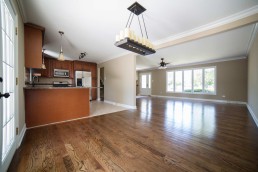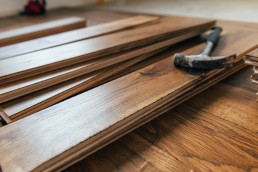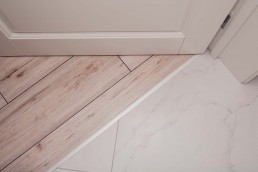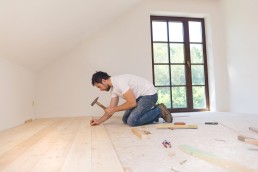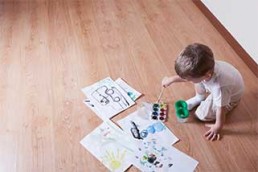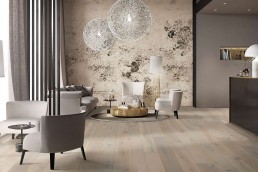The Environmental Benefits of Hardwood Flooring
With Earth Day just passing, now more than ever it is super important to look at your environmental footprint and ensure you are not creating waste. If you are looking for a sustainable flooring option, Hardwood Flooring may be the proper option for you!
- Renewable Resource: Hardwood comes from trees, which is a renewable and biodegradable resources. Unlike non-renewable flooring materials such as carpet or vinyl, which rely on fossil fuels and synthetic compounds. Because of this, Hardwood can be recycled and reused in many different ways.
- Energy Efficiency: Hardwood flooring offers energy efficiency benefits, particularly in homes with radiant heating systems. Wood has natural insulating properties that help retain heat, reducing the energy required for heating and cooling.
- Biodegradability: When you are done with your hardwood flooring, it is biodegradable and can be recycled or composted, minimizing its environmental impact compared to non-biodegradable materials. Hardwood flooring also has the ability to be repurposed or reused in many different ways.
Want to learn more about the benefits of Hardwood Flooring? Connect with one of our team members today, and we can walk you through the benefits of hardwood flooring.
Common Misconceptions About Luxury Vinyl Flooring
Luxury vinyl flooring (LVP) has gained popularity as a durable, versatile, and cost-effective flooring option. However, misconceptions about LVP may deter some homeowners from considering it for their spaces. In this blog post, we'll debunk common myths surrounding luxury vinyl flooring and shed light on the realities of this exceptional flooring solution.
Myth 1: Luxury Vinyl Flooring Looks Cheap and Fake
Reality: One of the most significant advancements in luxury vinyl flooring is its ability to mimic the look and feel of natural materials like hardwood and stone. High-quality LVF products feature realistic textures, grain patterns, and color variations that closely resemble their natural counterparts. With advancements in printing and embossing technologies, luxury vinyl flooring can achieve authentic visuals that elevate the aesthetic appeal of any space.
Myth 2: LVP is Not Durable
Reality: Contrary to popular belief, LVP is highly durable and resilient, making it suitable for high-traffic areas in residential and commercial settings. LVP is engineered with multiple layers, including a wear layer that protects against scratches, stains, and dents. Additionally, LVP is water-resistant, making it an excellent choice for kitchens, bathrooms, and other moisture-prone areas where traditional hardwood or laminate flooring may not be suitable.
Myth 3: LVP is Difficult to Install
Reality: While professional installation is recommended for optimal results, many luxury vinyl flooring products are designed for easy installation, even for DIY enthusiasts. Click-lock and adhesive-free installation systems allow for quick and hassle-free installation, reducing the time and labor costs associated with traditional flooring installations. Additionally, LVP is compatible with various subfloor types, including concrete, plywood, and existing flooring surfaces, making it a versatile option for renovation projects.
Myth 4: LVP Lacks Eco-Friendliness
Reality: Sustainable options are available in the luxury vinyl flooring market, with many manufacturers prioritizing environmental responsibility in their product offerings. Some LVP products are made from recycled materials, feature low-VOC emissions, and carry certifications such as FloorScore® and GREENGUARD Gold, indicating compliance with rigorous indoor air quality standards. Additionally, the longevity and durability of luxury vinyl flooring contribute to reduced waste and environmental impact over time.
Myth 5: LVP Decreases Home Value
Reality: LVP has become increasingly popular among homebuyers and real estate professionals due to its durability, low maintenance requirements, and aesthetic appeal. While some may argue that natural hardwood flooring adds more value to a home, modern LVP can offer comparable durability and visual appeal at a fraction of the cost. In fact, many homeowners view LVP as a practical and stylish flooring option that enhances the overall appeal of their homes.
LVP offers a versatile, durable, and cost-effective solution for homeowners seeking high-quality flooring with the look and feel of natural materials. By debunking common misconceptions about LVP and highlighting its numerous benefits, we hope to empower homeowners to make informed decisions when selecting flooring for their spaces. Don't let misconceptions deter you—LVP may be the perfect flooring solution for your home.
When and How to Refinish Your Hardwood Floors
Hardwood flooring adds timeless beauty and elegance to any home, but over time, wear and tear can take a toll on its appearance. Thankfully, hardwood floor refinishing offers a cost-effective solution to restore your floors to their former glory. In this guide, we'll delve into the ins and outs of hardwood floor refinishing, including when it's necessary and how to go about the refinishing process.
When to Refinish Your Hardwood Floors:
- Visible Signs of Wear and Damage: Scratches, dents, and stains are common signs that your hardwood floors are due for refinishing. If the damage is superficial and hasn't penetrated the wood, a simple refinishing job can renew their appearance.
- Fading or Discoloration: Sun exposure and foot traffic can cause hardwood floors to lose their luster and fade over time. Refinishing can revive the color and restore the natural beauty of your floors.
- Widespread Surface Imperfections: If your floors have numerous deep scratches, gouges, or water damage, refinishing may be necessary to repair the surface and prevent further deterioration.
- Dulling of Finish: High-traffic areas may show signs of wear where the finish has worn away, leaving the wood vulnerable to damage. Refinishing restores the protective layer and enhances the durability of your floors.
How to Refinish Your Hardwood Floors:
- Preparation: Begin by clearing the room of furniture and rugs. Thoroughly clean the floors to remove dirt, dust, and debris. If necessary, use a wood cleaner to remove stubborn stains.
- Sanding: Sanding is a crucial step in the refinishing process, as it removes the existing finish and smooths out imperfections in the wood. Start with a coarse-grit sandpaper to strip away the old finish, then gradually switch to finer grits for a smooth, even surface.
- Staining (Optional): If you desire a change in color or want to refresh the existing stain, apply a wood stain evenly to the sanded surface. Allow the stain to dry completely before proceeding to the next step.
- Applying Finish: Once the stain has dried, it's time to apply the finish. Choose a polyurethane finish for maximum durability and protection against wear and tear. Use a brush or applicator pad to apply the finish in long, even strokes, working with the grain of the wood. Allow the first coat to dry thoroughly before applying additional coats as needed.
- Curing: After applying the final coat of finish, allow the floors to cure for the recommended time before walking on them or replacing furniture.
Conclusion: Hardwood floor refinishing is a cost-effective way to breathe new life into your floors and enhance the beauty of your home. By knowing when to refinish your floors and following the proper steps, you can enjoy the timeless elegance of hardwood flooring for years to come. If you're unsure about tackling the refinishing process yourself, consider hiring a professional to ensure the best results.
Luxury Vinyl Flooring: A Modern Choice for Timeless Elegance in 2024
In the realm of interior design, flooring plays a pivotal role in shaping the ambiance and aesthetics of a space. As we step into 2024, the demand for flooring that combines luxury with practicality has never been higher. Enter luxury vinyl flooring, a versatile and sophisticated choice that has gained significant traction in recent years. In this blog post, we'll explore why luxury vinyl flooring is the ideal solution for your next project, drawing comparisons with traditional hardwood floors.
**1. Aesthetic Appeal:**
Luxury vinyl flooring has come a long way in mimicking the rich, natural look of hardwood. Technological advancements in printing and embossing techniques allow manufacturers to replicate the texture and grain patterns of hardwood with remarkable precision. This means that you can achieve the timeless elegance of hardwood floors without compromising on style or breaking the bank.
**2. Durability and Resilience:**
One of the standout features of luxury vinyl flooring is its durability. Unlike hardwood, which is susceptible to scratches, dents, and moisture damage, luxury vinyl flooring is engineered to withstand the rigors of everyday life. Its top wear layer provides a protective barrier against stains, spills, and heavy foot traffic. This resilience makes it an excellent choice for high-traffic areas, such as living rooms, kitchens, and entryways.
**3. Water Resistance:**
Traditional hardwood floors have a well-known weakness – water. Exposure to moisture can cause hardwood to warp, swell, or even develop mold. Luxury vinyl flooring, on the other hand, is inherently water-resistant. This makes it an ideal solution for spaces prone to spills or areas where moisture is present, such as bathrooms and basements. With luxury vinyl, you can enjoy the luxurious look of hardwood without worrying about water-related damage.
**4. Installation Versatility:**
Luxury vinyl flooring offers a variety of installation options, making it a versatile choice for different projects. It can be installed using the glue-down method, click-and-lock systems, or even as loose-lay planks. This flexibility simplifies the installation process, allowing for quicker and more cost-effective projects compared to the often intricate and time-consuming installation of hardwood floors.
**5. Cost-Effectiveness:**
While the allure of hardwood floors is undeniable, the associated costs can be a deterrent for many homeowners. Luxury vinyl flooring provides a cost-effective alternative that doesn't compromise on style or quality. With advancements in manufacturing techniques, luxury vinyl can closely emulate the appearance of hardwood at a fraction of the price, making it an attractive option for budget-conscious projects.
**6. Eco-Friendly Option:**
Sustainability is a growing concern in the construction and design industry. Hardwood flooring often involves harvesting mature trees, contributing to deforestation. Luxury vinyl flooring, on the other hand, is typically made from recycled materials and requires fewer natural resources in its production. Opting for luxury vinyl allows you to enjoy the look of hardwood while making an environmentally conscious choice.
**7. Low Maintenance:**
Maintaining hardwood floors can be labor-intensive, requiring periodic refinishing and careful cleaning to preserve their appearance. Luxury vinyl flooring, however, demands minimal maintenance. Regular sweeping or vacuuming and occasional damp mopping are usually sufficient to keep it looking pristine. This low-maintenance aspect makes luxury vinyl an attractive option for those seeking a beautiful floor without the time-consuming upkeep associated with hardwood.
In conclusion, luxury vinyl flooring stands out as the ideal choice for your next project in 2024, combining aesthetic appeal, durability, water resistance, installation versatility, cost-effectiveness, eco-friendliness, and low maintenance. While the classic charm of hardwood flooring endures, luxury vinyl offers a modern solution that meets the demands of contemporary lifestyles. As you embark on your next interior design endeavor, consider the elegance and practicality that luxury vinyl flooring can bring to your space.
Timeless Elegance: Why Hardwood Flooring Is the Ideal Choice for Your Projects in 2024
As we step into 2024, the world of interior design and home improvement is witnessing a resurgence of classic choices. One timeless option that continues to dominate the scene is hardwood flooring. In this blog, we'll delve into the enduring appeal of hardwood floors and why it remains an excellent choice for your projects this year.
**The Timeless Allure of Hardwood Flooring:**
Hardwood flooring has stood the test of time, captivating homeowners and designers alike with its timeless elegance. Its warm, natural tones and rich textures create an inviting ambiance in any space, making it a perennial favorite for those seeking a blend of sophistication and comfort.
**Durability and Longevity:**
One of the standout features of hardwood flooring is its durability. In 2024, with an increasing emphasis on sustainable and long-lasting materials, hardwood flooring emerges as a frontrunner. High-quality hardwood can withstand heavy foot traffic, making it an ideal choice for both residential and commercial spaces. Additionally, with proper care and maintenance, hardwood floors can last for generations, proving to be a wise investment for any project.
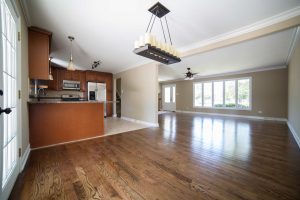
**Aesthetic Versatility:**
Hardwood flooring is a chameleon in the design world, seamlessly adapting to a variety of interior styles. From classic to contemporary, hardwood's versatility is unmatched. Whether you prefer the warm hues of oak, the deep richness of mahogany, or the modern appeal of lighter tones like maple, hardwood offers an extensive range of options to suit your aesthetic preferences.
**Natural Beauty and Authenticity:**
In an era where authenticity is cherished, hardwood flooring stands out for its genuine and natural appeal. Each plank tells a unique story, showcasing the knots, grains, and imperfections that add character and authenticity to the space. In 2024, as the demand for organic and authentic materials rises, hardwood flooring aligns perfectly with the ethos of embracing nature in design.
**Health and Environmental Benefits:**
Hardwood flooring contributes not only to the visual appeal of a space but also to its overall health. Unlike carpets that may trap allergens, hardwood floors are hypoallergenic and easy to clean. In an age where health-conscious choices are gaining prominence, hardwood flooring provides an environment-friendly solution.
From an environmental standpoint, responsibly sourced hardwood, certified by organizations like the Forest Stewardship Council (FSC), ensures that the material comes from sustainably managed forests. This commitment to eco-friendliness aligns with the growing trend of incorporating sustainable practices in interior design.
**Ease of Maintenance:**
Busy lifestyles demand low-maintenance solutions, and hardwood flooring fits the bill perfectly. Regular sweeping and occasional polishing are usually all it takes to keep hardwood floors looking pristine. In an era where time is a precious commodity, the ease of maintenance associated with hardwood flooring is a significant advantage.
**Incorporating Modern Technology:**
While hardwood flooring embraces tradition, it also adapts to modern technological advancements. In 2024, innovations in hardwood flooring include finishes that enhance durability and resistance to wear and tear. Additionally, precision milling and installation techniques ensure a seamless, modern look while preserving the classic charm of hardwood.
**Increased Property Value:**
Investing in hardwood flooring is not just an aesthetic choice but a smart financial decision. Homes and spaces adorned with hardwood floors tend to have higher resale values. Potential buyers often view hardwood flooring as a premium feature, adding to the property's overall appeal. In the competitive real estate market of 2024, hardwood flooring can give your project a distinct edge.
**Conclusion:**
As we navigate the design landscape of 2024, one thing remains clear: hardwood flooring is not merely a trend; it's a timeless classic that continues to reign supreme. With its durability, aesthetic versatility, natural beauty, and environmental benefits, hardwood flooring stands as an ideal choice for your projects this year. Whether you're renovating a home, designing a commercial space, or embarking on a new construction project, hardwood flooring promises to elevate the ambiance, creating a lasting impression that transcends fleeting design fads. Embrace the enduring allure of hardwood flooring – where tradition meets modernity in perfect harmony.
Elevate Your Space: A Comprehensive Guide on How to Properly Maintain Luxury Vinyl Flooring
Luxury vinyl flooring has emerged as a popular choice for homeowners seeking a perfect blend of style, durability, and low maintenance. Whether you've recently installed this elegant flooring option or are considering it for your space, understanding how to properly maintain luxury vinyl flooring is key to preserving its pristine appearance and longevity.
1. Regular Cleaning Routine:
Start with a gentle yet effective cleaning routine. Sweeping or vacuuming regularly removes dirt and debris that can scratch the surface over time. Opt for a soft-bristle broom or a vacuum cleaner with a soft brush attachment to ensure a thorough clean without causing damage.
2. Gentle Mopping Techniques:
Luxury vinyl flooring is resilient, but excessive moisture can still pose a risk. When mopping, use a damp mop rather than soaking the floor. Mix a mild vinyl floor cleaner with water and ensure that the mop is well-wrung before applying it to the floor. This prevents water from seeping into the seams and edges, preserving the integrity of your luxury vinyl flooring.

3. Immediate Spill Cleanup:
Accidents happen, but swift action can prevent long-term damage. Immediately clean up spills to avoid staining or warping of the vinyl. Use a soft cloth or paper towel to blot the spill gently. For more stubborn stains, a mixture of water and a mild vinyl floor cleaner can be used.
4. Protective Pads and Furniture Lifts:
While luxury vinyl flooring is resistant to scratches, it's advisable to use protective pads under furniture legs to avoid any potential damage during movement. When relocating furniture, lift it rather than dragging it across the floor. This simple step can significantly contribute to maintaining the surface integrity of your flooring.
5. Avoid Harsh Chemicals:
Luxury vinyl flooring is designed to withstand a variety of elements, but harsh chemicals can erode its protective layer. Steer clear of abrasive cleaners, wax-based products, and ammonia. Instead, opt for pH-neutral vinyl floor cleaners to preserve the sheen and longevity of your flooring.
6. Use Doormats and Area Rugs:
Proactive measures can go a long way in maintaining luxury vinyl flooring. Place doormats at entryways to capture dirt and grit before they reach the floor. In high-traffic areas, consider using area rugs or runners to provide an extra layer of protection and reduce wear in specific zones.
7. Temperature and Humidity Awareness:
Luxury vinyl flooring is versatile and resistant to temperature fluctuations, but extreme conditions can still impact its performance. Maintain a stable indoor climate with moderate temperature and humidity levels. Avoid exposing the flooring to excessive heat, as this may cause the vinyl to warp.
8. Periodic Deep Cleaning:
While regular cleaning is essential, a periodic deep clean ensures a more thorough maintenance approach. Depending on foot traffic and usage, plan to deep clean your luxury vinyl flooring a few times a year. Use a specialized vinyl floor cleaner and follow the manufacturer's recommendations for optimal results.
9. Trim Pet Nails:
Pets, while beloved, can inadvertently cause scratches on your luxury vinyl flooring. Regularly trim your pet's nails to minimize the risk of scratches. Additionally, consider placing rugs or mats in pet-frequented areas to provide an extra layer of protection.
10. Stay Informed with Manufacturer Guidelines:
Finally, every LVP product is unique, and manufacturers often provide specific guidelines for maintenance. Familiarize yourself with these recommendations to ensure you are caring for your flooring in a manner that aligns with its specifications, preserving both its appearance and warranty.
In conclusion, maintaining LVP is a straightforward process that involves a combination of routine care, proactive measures, and periodic deep cleaning. By incorporating these practices into your regular maintenance routine, you can ensure that your luxury vinyl flooring not only retains its aesthetic appeal but also stands the test of time in your home or business space. Elevate your surroundings with the beauty of LVP, and let proper maintenance be the key to a lasting, stylish investment.
Unveiling the Charms of Hardwood Flooring: A Basement Marvel

**1. Durability Beyond Compare:**
Basements often face challenges like moisture and temperature fluctuations. Hardwood flooring, when properly installed and finished, proves to be resilient against these conditions. Unlike some flooring materials that may warp or degrade in damp environments, hardwood maintains its structural integrity, ensuring a long-lasting investment that stands the test of time.
**2. Elegance Meets Versatility:**
Hardwood flooring is synonymous with sophistication. Its natural beauty adds a touch of elegance to any space, transforming your basement into a welcoming and stylish area. Additionally, the versatility of hardwood allows it to complement various design styles, from classic to contemporary, making it an ideal choice for homeowners with diverse aesthetic preferences.
**3. Warmth Underfoot:**
One of the distinctive qualities of hardwood is its ability to create a warm and inviting atmosphere. Unlike cold and unyielding surfaces like concrete, hardwood provides a comfortable and cozy feel underfoot. This feature is particularly valuable in basements, where the right flooring can turn an otherwise underutilized space into a cozy retreat for family and friends.
**4. Easy Maintenance:**
Hardwood flooring is renowned for its ease of maintenance. Regular sweeping and occasional mopping are usually sufficient to keep it clean and looking its best. This low-maintenance aspect is especially appealing in basements, where practicality is paramount. Unlike some flooring materials that require special care, hardwood simplifies the upkeep of your basement space.
**5. Timeless Appeal:**
Investing in hardwood floor is an investment in timelessness. While trends may come and go, the classic beauty of hardwood endures. Choosing hardwood for your basement project means creating a space that remains relevant and appealing for years to come. It's a choice that transcends fleeting fashions, ensuring that your basement stands out with enduring charm.
**6. Increased Property Value:**
Hardwood flooring has the power to enhance the overall value of your property. Potential homebuyers are often drawn to the timeless elegance and durability associated with hardwood. By opting for hardwood in your basement project, you not only elevate the aesthetics of your home but also contribute to its resale value.
**7. Sustainable and Eco-Friendly:**
For environmentally conscious homeowners, hardwood flooring is a sustainable choice. Many hardwoods used in flooring come from responsibly managed forests, ensuring the preservation of natural resources. Additionally, the longevity of hardwood means less frequent replacement, reducing the overall environmental impact associated with flooring materials that need frequent updates.
**8. Allergy-Friendly:**
Hardwood flooring is an excellent option for those with allergies. Unlike carpets that can trap allergens like dust and pet dander, hardwood provides a surface that is easy to clean and doesn't harbor allergens. This makes it a healthier choice, particularly in basements where proper ventilation can sometimes be a challenge.
In conclusion, hardwood flooring emerges as a stellar choice for basement projects, offering durability, elegance, warmth, and easy maintenance. Its timeless appeal, increased property value, sustainability, and allergy-friendly qualities make it a well-rounded investment that enhances both the aesthetics and functionality of your basement space. When you choose hardwood, you're not just selecting a flooring material; you're making a statement about the enduring beauty and quality of your home.
|
ReplyForward
Add reaction
|
The Top Benefits of Choosing Luxury Vinyl Plank (LVP) Flooring for Your Baby's Room
When it comes to creating a safe and comfortable environment for your little one, every decision matters. From choosing the right crib to picking out the perfect color for the walls, parents want nothing but the best for their baby. One often overlooked but crucial aspect is the flooring, and more and more parents are turning to Luxury Vinyl Plank (LVP) for their baby's room. In this blog, we'll explore why LVP is an excellent choice for creating an ideal space for your little bundle of joy.
1. Safety First: Slip Resistance and Softness
Safety is a top priority when it comes to your baby's room, and LVP excels in this regard. One of its standout features is its slip resistance. Babies are prone to spills and accidents as they learn to crawl and walk. LVP's textured surface provides a stable footing, reducing the risk of slips and falls. Additionally, LVP has a softer feel underfoot compared to other flooring options, making it a comfortable choice for both you and your baby.
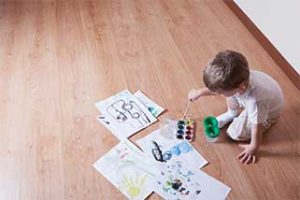 2. Durability for the Long Haul
2. Durability for the Long Haul
Babies are notorious for creating messes, from spit-ups to diaper leaks. LVP is known for its durability and resilience against stains and spills. It's easy to clean, and its waterproof nature ensures that accidents won't result in long-term damage. This means that your baby's room can maintain its pristine appearance even in the face of daily baby-related challenges.
3. Hypoallergenic Properties
Babies have delicate respiratory systems, and maintaining a hypoallergenic environment is crucial. Unlike carpets, which can harbor allergens like dust mites and pet dander, LVP is an excellent choice for minimizing potential allergens. Its smooth surface doesn't trap particles, making it easier to keep the room clean and safe for your baby's sensitive lungs.
4. Easy Maintenance: More Playtime, Less Cleanup
Parents are often on the lookout for ways to simplify their lives, and LVP fits the bill perfectly. Its low-maintenance nature means less time spent cleaning and more time enjoying precious moments with your baby. A simple sweep or mop is usually all it takes to keep LVP flooring looking fresh and inviting. This easy upkeep is a game-changer for busy parents.
5. Versatility in Design Choices
Creating a visually appealing and stimulating environment for your baby is essential for their cognitive development. LVP comes in a wide array of colors and patterns, allowing you to choose a design that complements your overall nursery theme. Whether you prefer a classic wood look or a modern, vibrant pattern, LVP provides the flexibility to achieve the aesthetic you desire.
6. Temperature Regulation
Maintaining a comfortable temperature in your baby's room is crucial for their well-being. LVP has excellent thermal properties, helping to regulate the room's temperature. It remains cool in summer and can be paired with radiant heating systems for added warmth during colder months. This ensures that your baby's room remains a cozy and inviting space year-round.
7. Budget-Friendly Option
Parenthood often comes with various expenses, and finding cost-effective solutions is always a plus. LVP is a budget-friendly flooring option that doesn't compromise on quality. Its durability and longevity make it a smart investment that can withstand the wear and tear of a growing family.
In conclusion, Luxury Vinyl Plank flooring emerges as an ideal choice for creating a safe, comfortable, and visually pleasing environment for your baby. Its safety features, durability, hypoallergenic properties, easy maintenance, design versatility, temperature regulation, and budget-friendly nature make it a top contender for parents looking to provide the best for their little ones. Consider LVP as you embark on the journey of creating a nursery that nurtures both the senses and the safety of your precious bundle of joy.
Choosing The Right Finish For Hardwood Floors
Choosing the right finish for hardwood floors is a critical decision that can significantly impact the overall aesthetic and maintenance of your living space. One of the primary considerations is whether to opt for a shiny finish or a non-shiny (matte or satin) finish. In this blog, we'll explore the pros and cons of both options, helping you make an informed decision based on your preferences and lifestyle.
 Pros of Shiny Finished Hardwood:
Pros of Shiny Finished Hardwood:
1. Elegant Aesthetics:
Shiny finished hardwood floors exude a timeless and elegant appeal. The glossy surface reflects light, creating a luxurious and polished look that can enhance the overall aesthetic of your home. The shine brings out the natural beauty of the wood, showcasing its grains and patterns in a way that adds sophistication to any room.
2. Easy to Clean:
The smooth surface of shiny finished hardwood makes it relatively easy to clean and maintain. Dust and dirt are less likely to cling to the glossy surface, and spills can be wiped away effortlessly. This feature is particularly advantageous for busy households or those with children and pets, as the glossy finish resists stains more effectively than matte finishes.
3. Durability and Resistance:
Shiny finishes often include multiple layers of protective coating, enhancing the durability of the hardwood. The added layers provide resistance against scratches, scuffs, and general wear and tear. This durability ensures that the flooring maintains its glossy sheen over time, contributing to a longer lifespan for your hardwood floors.
Cons of Shiny Finished Hardwood:
1. Visible Scratches and Imperfections:
While shiny finishes offer durability, they can also be more prone to showing scratches and imperfections. The reflective surface can highlight any marks or damage, making them more noticeable. This factor might be a concern for homeowners who prioritize a flawless appearance and are wary of the visible signs of wear.
2. Maintenance Challenges:
Despite being easier to clean in some respects, shiny finishes can be more demanding when it comes to maintenance. Smudges, footprints, and water spots are more noticeable on glossy surfaces, requiring more frequent cleaning to keep the floors looking pristine. This level of maintenance might be a drawback for individuals with a hectic lifestyle.
Pros of Non-Shiny (Matte or Satin) Finished Hardwood:
1. Natural and Subtle Look:
Non-shiny finishes, such as matte or satin, offer a more natural and subtle appearance. The lack of a glossy sheen allows the true character of the wood to shine through without added reflections. This aesthetic is ideal for those who prefer a more understated and muted look in their living spaces.
2. Conceals Scratches and Imperfections:
Matte or satin finishes are excellent at concealing scratches, scuffs, and other imperfections. The lack of a reflective surface minimizes the visibility of marks, making these finishes a practical choice for homeowners who want a low-maintenance flooring option that ages gracefully.
3. Enhanced Grip and Traction:
Non-shiny finishes are often more slip-resistant than their glossy counterparts. This can be particularly advantageous in homes with children, elderly individuals, or individuals with mobility concerns. The added grip and traction contribute to a safer environment, especially in areas prone to spills or moisture.
Cons of Non-Shiny (Matte or Satin) Finished Hardwood:
1. Less Dramatic Aesthetics:
While matte or satin finishes offer a subtle and natural look, they might lack the dramatic impact and visual depth associated with shiny finishes. The absence of a glossy sheen means less light reflection, potentially resulting in a less vibrant appearance.
2. Challenges in Cleaning Stains:
Non-shiny finishes may require more effort when it comes to cleaning certain stains. Spills and marks can be absorbed by the wood more readily, making it necessary to address them promptly to avoid long-term damage. This could be a consideration for those who prefer a flooring option with minimal upkeep.
Conclusion:
Choosing between shiny and non-shiny finishes for hardwood flooring ultimately comes down to personal preferences, lifestyle, and the desired aesthetic for your home. Shiny finishes bring a touch of glamour and are easier to clean but may require more attention to maintenance. On the other hand, non-shiny finishes offer a more natural look, are forgiving of imperfections, and provide enhanced traction. Consider your priorities and lifestyle factors to determine which type of finish aligns best with your vision for a beautiful and functional living space.
The Elegant Option of Luxury Vinyl Tile Flooring
Luxury Vinyl Tile (LVT) flooring has emerged as the epitome of sophistication and practicality in the world of interior design. As homeowners increasingly seek elegance without compromising on durability, LVT has become the go-to option for flooring that seamlessly combines style and resilience. In this blog, we'll delve into the nuances of luxury vinyl tile flooring, exploring its key features, benefits, and why it stands out as an elegant option for modern living spaces.
Unveiling the Elegance of Luxury Vinyl Tile:
Luxury vinyl tiles are engineered to mimic the look and feel of natural materials, such as hardwood or stone, with a level of authenticity that is truly remarkable. The advanced printing and embossing technologies used in the manufacturing process allow LVT to replicate the intricate details of wood grains, textures, and even the subtle variations found in natural stone. This means homeowners can enjoy the luxurious aesthetics of premium materials without the associated maintenance challenges.
Endless Design Possibilities:
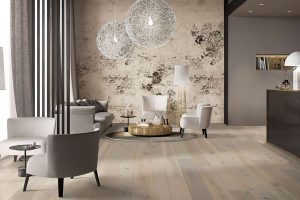
One of the standout features of luxury vinyl tile flooring is its versatility in design. Whether you prefer the classic warmth of oak, the contemporary allure of concrete, or the timeless beauty of marble, LVT offers a diverse range of design options. The ability to mix and match different patterns, colors, and sizes opens up endless possibilities for creating personalized and visually stunning flooring arrangements. This adaptability ensures that luxury vinyl tiles seamlessly integrate into any interior design concept, from traditional to modern.
Durability Beyond Compare:
Luxury vinyl tiles are engineered for durability, making them an ideal choice for high-traffic areas in residential and commercial spaces. The wear layer on top of the tiles provides resistance against scratches, stains, and dents, ensuring that the flooring maintains its pristine appearance even in the face of daily wear and tear. This resilience makes LVT a sensible investment, as it significantly extends the lifespan of the flooring compared to other materials.
Waterproof and Low Maintenance:
The elegance of luxury vinyl tiles is not only skin-deep but extends to their functional attributes. Unlike natural materials, LVT is inherently waterproof, making it an excellent choice for moisture-prone areas like kitchens and bathrooms. The waterproof nature of luxury vinyl tile flooring adds a layer of protection against spills and accidents, making it easy to clean and maintain. Regular sweeping and occasional mopping are typically all that's needed to keep LVT looking as good as new.
Comfort Underfoot:
Beyond aesthetics and durability, LVT also prioritize comfort. The soft and resilient nature of LVT provides a comfortable surface underfoot, making it an excellent choice for spaces where people stand for extended periods. Whether you're hosting a dinner party or spending time in the kitchen, the cushioned feel of luxury vinyl tile flooring enhances the overall comfort of your living spaces
Installation Ease:
Elegance meets convenience with the easy installation of luxury vinyl tiles. Many LVT products come with innovative click-lock systems that allow for straightforward and quick installation, making it a suitable choice for both DIY enthusiasts and professional installers. The hassle-free installation process adds to the overall allure of luxury vinyl tile flooring as a practical and stylish flooring solution.
Budget-Friendly Elegance:
While luxury often comes with a hefty price tag, LVT break the mold by offering an elegant flooring solution at a fraction of the cost of natural materials. This affordability makes LVT an attractive option for homeowners who seek the sophistication of high-end flooring without exceeding their budget. The cost-effectiveness of luxury vinyl tile flooring ensures that you can achieve a luxurious look without compromising on quality.
In Conclusion:
Luxury vinyl tile flooring stands out as the elegant option for those who appreciate the beauty of high-end materials but also value practicality and resilience. With its authentic aesthetics, durability, waterproof features, and ease of maintenance, LVT strikes a perfect balance between luxury and functionality. As interior design trends evolve, LVT continue to be a timeless choice that transcends fleeting fads, providing a foundation of elegance for homes and spaces that aspire to make a lasting impression.

